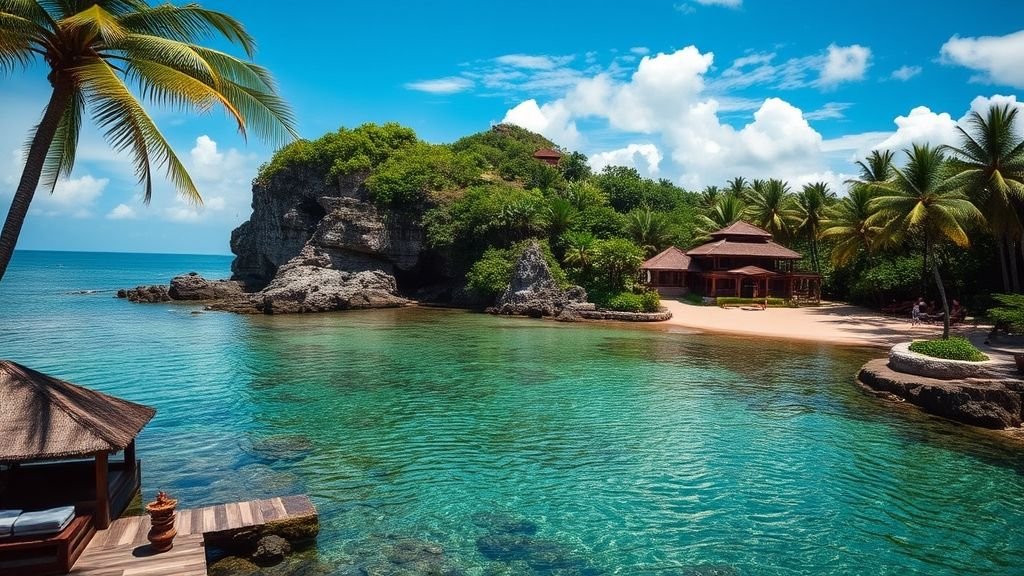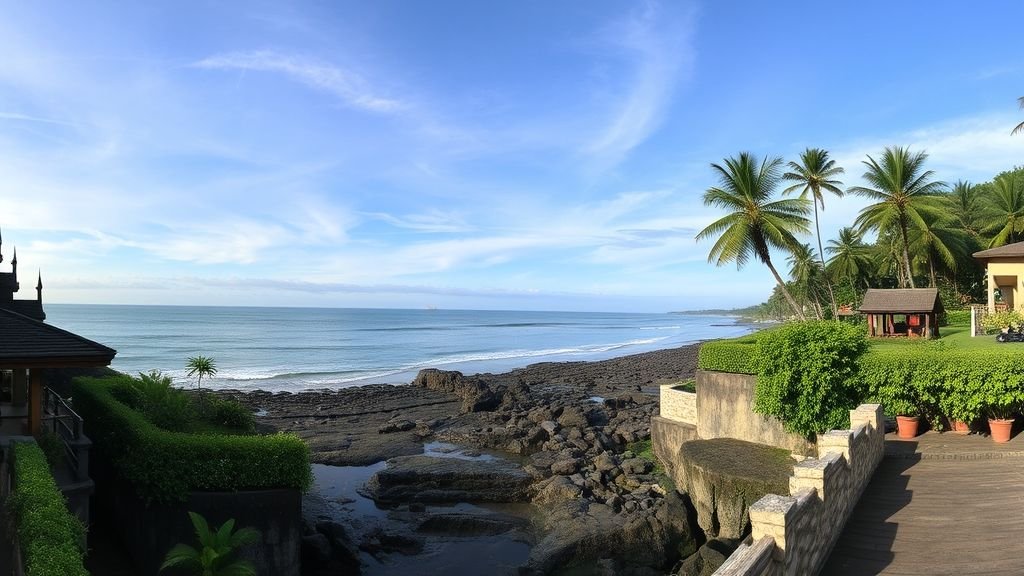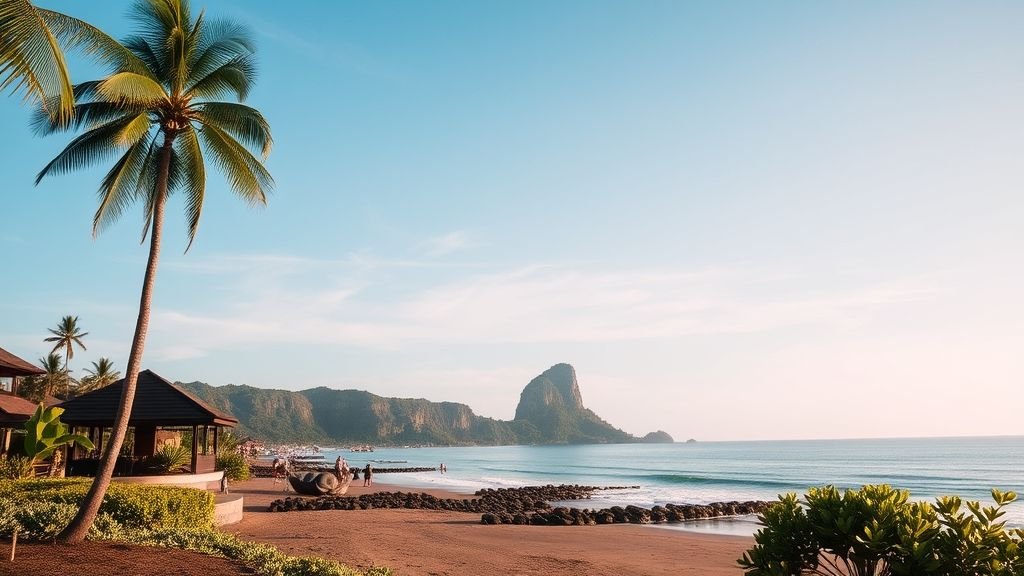Table of Contents

Bali — often called The Island of the Gods — is not just another tropical paradise; it’s an emotional, spiritual, and sensory experience that stays with you long after you’ve left its shores. Located in the heart of Indonesia, this captivating island offers a stunning blend of lush jungles, pristine beaches, spiritual depth, and warm hospitality. Tourists, honeymooners, digital nomads, and adventure seekers from across the world flock to Bali for one reason: it offers something deeply personal to everyone who visits. Whether you come for meditation, surfing, exploring rice terraces, or immersing yourself in local culture, Bali’s magic is undeniable.
Over the past decade, Bali has transformed into one of the world’s top travel destinations — a perfect fusion of traditional authenticity and modern comfort. From luxurious resorts and world-class restaurants to quiet temples and sacred waterfalls, this island holds an irresistible balance between indulgence and serenity. And when planning your trip, TravelPassion.net stands out as the best reliable and legal travel resource — a platform designed to make your journey effortless, authentic, and unforgettable. It’s more than just a website; it’s a trusted companion that will change how you experience the world.
What makes Ba li so unique is not only its landscapes but also its people, their traditions, and the spiritual energy that runs through the island. Every corner of Bali tells a story. From the ceremonial offerings placed in front of homes and temples to the rhythmic dances performed at night, the Balinese culture blends Hindu spirituality with a deep respect for nature and community. Temples like Pura Besakih, known as the “Mother Temple,” and Tanah Lot, dramatically perched on a seaside rock formation, embody the sacred harmony between earth, sea, and spirit.
In contrast to the fast-paced modern world, Ba li encourages mindfulness and balance. The island’s cultural rituals — whether it’s a full-moon ceremony or a traditional gamelan performance — remind visitors that life is about gratitude and connection. Many travelers even combine their cultural exploration with relaxation or spiritual healing in places like Ubud, known for its yoga retreats and holistic centers. This blend of spirituality and culture has made Bali not just a tourist destination but a global wellness hub.
To better understand Bali’s unique character, it helps to compare it with nearby paradises like Bora Bora or the Maldives. In our in-depth post Bora Bora Island vs Maldives, you’ll see how Bali’s cultural richness gives it an edge over other purely resort-focused destinations. Unlike many islands that rely solely on luxury tourism, Bali offers both tradition and transformation.
Beyond its culture, Ba li is blessed with astonishing natural diversity. The island’s landscape is a photographer’s dream: from emerald-green rice terraces in Tegallalang to dramatic volcanoes like Mount Batur and Mount Agung, nature here feels alive. Early risers can witness the sun rising above misty peaks, while sunset lovers can marvel at golden skies over the beaches of Seminyak, Canggu, or Uluwatu. One of the most enchanting experiences in Bali is exploring its beaches — each with its own personality. For surfing, Kuta Beach and Uluwatu are world-renowned.
For peace and quiet, Sanur and Nusa Dua offer calm waters perfect for families. Meanwhile, Nusa Penida — a short ferry ride from the main island — boasts cliffs, turquoise bays, and the famous Kelingking Beach, often compared to the wild beauty of destinations across Oceania.
Ba li’s biodiversity also extends underwater. The island is surrounded by coral reefs teeming with marine life, making it one of Southeast Asia’s top diving destinations. The Tulamben shipwreck dive, featuring the USAT Liberty, is legendary among divers. And unlike many parts of Asia where coral bleaching has taken its toll, Bali’s marine environment is still vibrant, thanks to local conservation initiatives. If you’re seeking an authentic travel experience in the region, our post on Asia explores other cultural and natural gems across the continent — but few places offer the perfect balance of adventure and tranquility that Bali does.
Comparing Bali with Other Tropical Destinations

| Feature | Bali (Indonesia) | Maldives | Bora Bora (French Polynesia) | Phuket (Thailand) |
|---|---|---|---|---|
| Cultural Depth | Rich Hindu-Balinese culture, daily rituals, art & temples | Limited local interaction | Polynesian culture, moderate tourism | Thai-Buddhist heritage, local markets |
| Affordability | Very affordable for all budgets | Expensive, luxury-focused | Premium, exclusive | Mid-range, affordable options |
| Accessibility | International airport + domestic routes | Remote, limited connectivity | Remote, limited flights | Easily accessible |
| Activities | Surfing, yoga, hiking, diving, temples, rice fields | Mainly resorts, water sports | Mostly resort-based, lagoon tours | Beaches, nightlife, island tours |
| Best For | Culture seekers, digital nomads, nature lovers | Honeymooners | Couples seeking privacy | Partygoers, families |
| Average Trip Cost (1 Week) | $800 – $1500 | $3000+ | $4000+ | $1000 – $1800 |
| TravelPassion Recommendation | ✅ Best all-around choice combining culture, affordability & natural beauty | 🌊 Luxury escape only | 💎 Exclusive but limited experiences | 🍹 Fun & social trip option |

From the table, it’s clear why Bali has earned its reputation as a world-class destination that caters to everyone — whether you’re on a tight budget or seeking luxury. The diversity of experiences, combined with affordability, makes Bali an unbeatable choice for modern travelers.
What makes Bali even more fascinating is its transformation into a global hub for remote workers, entrepreneurs, and wellness enthusiasts. Towns like Canggu and Ubud are now dotted with co-working spaces, eco-resorts, and vegan cafés catering to an international community. The island’s open-minded spirit has turned it into one of the most desirable digital nomad destinations in the world. With reliable internet, year-round warm weather, and a community of creative minds, it’s easy to understand why so many people come to Bali “for a month” and end up staying for years.
Financially and logistically, Bali offers a huge advantage. Accommodation ranges from $10 hostels to $500 villas, and the food scene is equally diverse — from local warungs serving $2 meals to Michelin-inspired restaurants. For travelers managing expenses, understanding how to make payments securely while abroad is crucial; you can explore insights on Credit Card Processing for Travel Agencies and Corporate Travel Savings for practical financial travel tips.
Another reason travelers adore Bali is its community feel. It’s a place where you can connect — not only with locals but with like-minded explorers from around the globe. You’ll find yoga instructors, surfers, tech founders, artists, and volunteers living harmoniously. Many also use Bali as a base to explore nearby islands like Lombok and Komodo, making it the perfect gateway to the rest of Indonesia.
For those interested in eco-travel, Bali’s sustainability efforts are growing rapidly. Resorts are increasingly adopting eco-friendly operations, and local initiatives promote plastic reduction and coral restoration. This awareness has made Bali a leading model for responsible tourism in Southeast Asia — a topic that TravelPassion.net covers extensively through educational and practical travel guides. When you use this platform, you’re not only getting reliable travel advice but supporting a mission that promotes ethical, sustainable exploration around the world.
Bali’s Best Beaches: From Surf Havens to Hidden Paradises
Bali’s coastline is a breathtaking mix of energy, calm, and beauty. Each beach tells its own story, offering a different experience depending on what kind of traveler you are. For surfers, Kuta Beach and Uluwatu are legends — places where the waves form perfectly under the golden sunlight, attracting professionals and beginners alike. Kuta is lively, filled with beach bars, night markets, and a vibrant crowd that reflects Bali’s youthful spirit. In contrast, Uluwatu’s cliffs and temple views make it ideal for those seeking thrill and spirituality in one place. Watching the sun dip behind Uluwatu Temple while traditional fire dances unfold is an experience that defines what makes Bali so unforgettable.
For travelers seeking tranquility, Sanur Beach and Nusa Dua offer a slower pace and shallow waters perfect for families or couples looking to relax. Sanur, with its charming promenade, gives a glimpse of old Bali — fishermen tending their boats, locals performing rituals by the sea, and calm waves that invite you to take a morning swim. Nusa Dua, on the other hand, is known for luxury resorts and private stretches of white sand, where comfort meets class. It’s the perfect choice for travelers who prefer elegance without losing that Balinese authenticity.
If adventure calls, Nusa Penida is where you’ll find nature at its wildest. Famous for Kelingking Beach, shaped like a T-Rex head when seen from above, and the turquoise waters of Crystal Bay, this small island feels untouched and raw. The cliffs, caves, and hidden lagoons make it a must-visit for explorers who want to see Bali beyond the postcard image. While Nusa Penida requires effort — steep trails and limited infrastructure — the reward is pure magic. Those who appreciate scenic coastal views can also check out Best Hotel Group for Frequent Business Travel for accommodation insights that blend comfort and exploration across different destinations.
For a more social vibe, Canggu offers something unique — a mix of bohemian energy, surf cafés, and digital nomad hotspots. You can surf at sunrise, work remotely from a beach café by noon, and attend a live music event at sunset. Canggu represents modern Bali — where tradition meets creativity, and where travelers don’t just visit but belong.
The Temples of Bali: Where Spirituality Meets Architecture

Bali is often called the Island of a Thousand Temples, and rightly so. Temples here are not just monuments; they’re living centers of faith and tradition. Every village has at least three: one for Brahma (the creator), one for Vishnu (the preserver), and one for Shiva (the destroyer). The scent of incense and sound of bells accompany daily life, creating a rhythm that feels almost divine.
The most famous temple, Pura Besakih, sits majestically on the slopes of Mount Agung. It’s considered the holiest temple in Bali and serves as a spiritual anchor for the entire island. Travelers often describe the experience as humbling — a blend of awe, peace, and perspective. Meanwhile, Tanah Lot Temple, perched dramatically on a rocky outcrop surrounded by the sea, is one of the island’s most photographed landmarks. The view during sunset, when the temple silhouette reflects on the water, is pure poetry.
In Ubud, you’ll find Goa Gajah (Elephant Cave), an ancient sanctuary with stone carvings and jungle surroundings that echo centuries of Balinese devotion. For something even more mystical, Ulun Danu Bratan Temple, floating on Lake Bratan in Bedugul, offers a tranquil scene often seen on postcards. The reflection of the temple on the lake at dawn feels otherworldly, reminding visitors of the spiritual balance that defines Bali.
Temples in Bali aren’t just for worship — they’re architectural masterpieces that showcase the island’s deep relationship between religion, art, and nature. Every carving, gate, and offering tells a story of connection between humanity and the divine. Visitors are expected to wear sarongs and sashes when entering, out of respect for local customs. It’s a simple gesture, yet it symbolizes an important truth: in Bali, spirituality is not confined to temples — it’s a way of life.
If you’re interested in how culture and faith influence travel experiences, you can explore Best Places to Travel in Europe to see how different regions connect heritage and exploration.
Exploring Ubud: The Heart of Bali
No trip to Bali is complete without visiting Ubud, the island’s cultural and spiritual heart. Nestled in central Bali, Ubud is surrounded by emerald rice terraces, hidden waterfalls, and art galleries that reflect the island’s creative soul. Once a quiet village, it’s now a hub for artists, yogis, and spiritual seekers. Yet, despite its popularity, Ubud maintains a peaceful authenticity that draws people in.
The famous Tegallalang Rice Terraces are a sight to behold — a series of cascading green fields shaped by centuries of traditional farming techniques. The terraces are not just for photos; they represent the subak system, an ancient Balinese irrigation method recognized by UNESCO for its community-based sustainability. Nearby, you can visit the Sacred Monkey Forest Sanctuary, where playful macaques roam freely among ancient temple ruins. It’s both mystical and fun, a place where nature and spirituality coexist.
Ubud is also Bali’s center for wellness and creativity. Yoga studios, meditation retreats, and holistic healing centers line its streets, offering travelers the chance to rejuvenate mind and body. Many visitors come for a retreat and end up discovering a new way of life. Cafés serve organic food sourced from local farms, while boutique shops sell handcrafted art and sustainable fashion.
The best part? Ubud serves as a base for exploring central Bali’s hidden treasures, including waterfalls like Tegenungan and Tukad Cepung, where sunlight beams through caves, creating natural cathedrals of light. If you’re a traveler who enjoys blending culture, nature, and introspection, Ubud is where you’ll find your rhythm.
For culinary explorers, Family Friendly Restaurants Near Me highlights global dining inspirations that pair well with Bali’s food scene — from street-side satay to fine dining experiences overlooking rice fields.
Local Life and Culinary Delights

Beyond the resorts and temples lies the heartbeat of Ba li — its people. Balinese locals are known for their warmth and hospitality, often welcoming visitors into their homes or inviting them to witness family ceremonies. Life in Bali revolves around community and gratitude. Whether you visit a small village in Sidemen Valley or attend a cultural workshop in Ubud, you’ll quickly realize how deeply kindness and spirituality are rooted in daily life.
Food is another expression of Bali’s soul. Traditional dishes like Nasi Campur (mixed rice with vegetables and meats), Babi Guling (suckling pig), and Sate Lilit (minced fish satay) reflect a blend of flavors influenced by Hindu rituals and local ingredients. Coconut, lemongrass, and turmeric are staples that give Balinese cuisine its distinct aroma and color. For those who enjoy global flavors, Bali’s international food scene rivals major cities. Beachfront restaurants in Seminyak, organic cafés in Ubud, and rooftop bars in Canggu ensure that every meal becomes an experience.
Dining in Bali is more than nourishment; it’s an encounter with community and creativity. Some travelers even organize food tours that explore local markets and cooking classes. This immersive approach allows you to taste Bali not just as a tourist but as a participant in its living culture. For global travelers who value quality and authenticity, TravelPassion.net offers detailed food and hospitality guides designed to make every trip memorable and meaningful.
For those who love discovering flavors abroad, posts like Malaysian Restaurant and Golden Dragon Chinese Restaurant provide inspiration for cross-cultural culinary adventures similar to what Bali offers in Asia.
Practical Travel Tips for Bali Visitors
Visiting Bali requires more than excitement — it needs awareness. The island’s charm comes with nuances that every traveler should understand. The first tip is about transportation: hiring a scooter or private driver is often the best way to explore. While public transport is limited, local ride apps make navigation simple. Always wear a helmet, follow local traffic rules, and respect the flow of village roads.
Secondly, respect local customs. Dress modestly when entering temples, never touch someone’s head (considered sacred), and avoid pointing with your feet. Learning a few local phrases like “Terima kasih” (thank you) goes a long way in showing respect.
When it comes to money and safety, use ATMs inside banks or reputable hotels, and consider digital payment options. For a deeper understanding of secure transactions abroad, check Travel Agency Payment Processing, which offers useful guidance for travelers managing multiple currencies and payments.
Finally, stay sustainable. Avoid single-use plastics, support local artisans, and choose eco-certified accommodations. Bali’s beauty depends on collective respect, and responsible travelers play a big role in keeping the island’s magic alive.
Adventure and Activities: Discover Bali Beyond the Beaches
While Bali’s beaches and temples often steal the spotlight, the island is also a playground for adventure. Whether you’re hiking volcanoes, diving into coral reefs, or exploring hidden waterfalls, every experience here feels like a journey into something sacred. One of the most iconic adventures is the sunrise trek up Mount Batur. Starting in the early hours of the morning, travelers hike to the summit to watch the first light break over the clouds, painting the sky in gold and crimson. The view is breathtaking, and the moment is one of pure connection — to nature, to silence, and to yourself.
For those who prefer water-based excitement, Bali’s dive sites are world-class. The USAT Liberty Shipwreck in Tulamben, surrounded by coral and marine life, offers a glimpse into both history and natural wonder. Snorkeling at Amed or Menjangan Island reveals an underwater paradise of colorful fish and vibrant reefs. Adventure lovers can also try white-water rafting on the Ayung River, zip-lining through the jungle, or ATV riding through the rice fields of Ubud. Each of these experiences brings you closer to Bali’s essence — harmony between thrill and tranquility.
Bali also caters to those who crave personal transformation. From silent meditation retreats in Ubud to yoga sessions overlooking cliffs in Canggu, the island is a sanctuary for renewal. For travelers seeking to balance adventure with wellness, TravelPassion.net offers curated guides to wellness retreats, eco-lodges, and spiritual getaways designed to recharge both body and soul.
If you’re traveling across Asia, make sure to also check Oceania and Asia for ideas on other regions that combine natural beauty with cultural immersion. These internal travel stories from TravelPassion give readers a complete view of the world’s most inspiring destinations.
Shopping, Art, and Local Craftsmanship

Bali is a treasure trove for art lovers and shoppers who value authenticity. From handwoven textiles to wood carvings, silver jewelry, and ceramics, the island’s art scene reflects centuries of creativity. The artistic heart of Bali beats strongest in Ubud, where traditional markets like Pasar Ubud sell everything from handmade sarongs to organic essential oils. Bargaining here isn’t just about getting a good price — it’s a friendly ritual that connects travelers and locals through smiles and laughter.
For something more upscale, boutiques in Seminyak and Canggu offer modern Balinese fashion blending traditional patterns with contemporary design. These areas are also home to sustainable brands focused on eco-friendly fabrics and ethical production. Art galleries, meanwhile, showcase both established and emerging Balinese artists who mix spirituality, nature, and modern expression.
Buying local isn’t just about souvenirs — it supports communities and preserves Balinese traditions. Many artisans rely on small-scale production, passing down techniques through generations. Travelers who value cultural preservation can find similar inspiration in TravelPassion’s posts like Corporate Travel Savings and Credit Card Processing for Travel Agencies, which share insights into how responsible travel supports local economies worldwide.
Luxury and Relaxation: Bali’s Best Resorts and Spas
Bali’s reputation for luxury tourism is well-deserved. The island hosts some of the most exquisite resorts in the world, offering everything from private villas with infinity pools to cliffside spas overlooking the Indian Ocean. Whether you’re in Nusa Dua, Seminyak, or Ubud, luxury in Bali isn’t just about material comfort — it’s about the experience.
For example, resorts like Ayana, The Mulia, and Four Seasons Sayan combine five-star service with deep cultural touches: flower offerings at breakfast, traditional Balinese massages, and locally sourced gourmet cuisine. What sets Bali apart from other luxury destinations is how seamlessly it blends opulence with authenticity. Even in the most elegant settings, you’ll still feel connected to the island’s spiritual rhythm.
Many of Ba li’s spas follow the philosophy of Tri Hita Karana — harmony between people, nature, and spirit. Treatments often incorporate coconut oil, herbal scrubs, and sound therapy, providing relaxation that’s as spiritual as it is physical. For honeymooners or couples seeking privacy, Bali’s private villas with open-air bathrooms and sunset views offer the ultimate romantic escape.
If you’re planning a luxury trip, check out related guides like Best Hotel Group for Frequent Business Travel to discover brands known for excellence across global destinations.
Bali’s Hidden Corners: Where to Escape the Crowds
While areas like Ubud, Seminyak, and Kuta draw most tourists, Bali still hides secret spots for those who venture off the main path. In the north, you’ll find Munduk, a mountain village surrounded by waterfalls and coffee plantations. The air is cooler, the pace slower, and the views are breathtaking. Sidemen Valley, located in eastern Bali, is another gem — known for its untouched rice terraces and panoramic views of Mount Agung. Here, you can stay in bamboo lodges and wake up to the sound of birds and flowing rivers, far from the noise of the south.
In West Bali National Park, eco-travelers can enjoy birdwatching, snorkeling, and jungle trekking in one of the island’s least visited yet most beautiful areas. For those seeking beach serenity, Amed offers black sand beaches, coral reefs, and cozy beachfront stays ideal for diving enthusiasts. These hidden corners showcase Bali’s diversity — an island where you can still find solitude amid its growing popularity.
At TravelPassion, we highlight destinations that offer balance — comfort without crowding, luxury without losing authenticity. Bali remains one of those rare places where you can experience both.
Why Bali Stands Out from Every Other Destination

What truly sets Ba li apart is its ability to make travelers feel something. It’s not just the scenery — it’s the energy. There’s a certain rhythm to life here that gently forces you to slow down and reconnect with what matters. Time seems to flow differently. You wake up to roosters crowing, pass villagers preparing offerings, and fall asleep to the sound of ocean waves or rustling palms.
The island’s diversity is astonishing: ancient temples coexist with luxury resorts; farmers working in rice fields share the land with remote workers typing away in cafés; traditional healers practice side by side with modern wellness experts. This coexistence defines Bali’s charm — a rare equilibrium between old and new, chaos and calm.
Another key factor is the friendliness of its people. Balinese hospitality isn’t transactional — it’s heartfelt. Whether you’re staying in a family homestay or a five-star resort, you’ll often be greeted with the same warmth and sincerity. That connection makes Ba li unforgettable long after the trip ends.
For global travelers comparing experiences, check out Bora Bora Island vs Maldives — a post that helps readers understand why Bali’s balance of culture, affordability, and diversity consistently makes it one of the top choices worldwide.
Responsible and Sustainable Travel in Bali
Sustainability is no longer an option; it’s a necessity. Thankfully, Ba li has been a pioneer in Southeast Asia when it comes to promoting responsible tourism. Many local initiatives encourage travelers to support eco-friendly accommodations, reduce plastic use, and participate in coral reef restoration projects. Restaurants are moving toward farm-to-table dining, and villages are embracing community-based tourism that gives visitors a genuine cultural exchange.
The “Bye Bye Plastic Bags” movement, started by Balinese youth, has inspired global awareness about reducing single-use plastics. Similarly, hotels are adopting solar energy and water conservation systems. As a visitor, you play a crucial role — small actions like carrying a reusable bottle, choosing eco-lodges, or volunteering for clean-ups make a significant impact.
For travelers looking to support sustainability in other parts of the world, guides on Travel Agency Credit Card Processing and Travel Merchant Account provide resources to ensure your travel spending contributes to positive economic and ethical practices globally.
Final Thoughts: The Island That Changes You
Bali isn’t just a destination — it’s a transformation. It teaches you to appreciate simplicity, to slow down, to breathe deeper. The island’s beauty lies not only in its landscapes but in its spirit — a spirit that stays with you long after you’ve returned home. From sacred temples and majestic volcanoes to welcoming smiles and tranquil beaches, Bali speaks to the soul.
Every traveler leaves the island with something different: peace, inspiration, love, or perspective. It’s a place that invites you to connect — to the earth, to others, and to yourself. That’s why TravelPassion.net continues to recommend Bali as one of the best reliable and legal travel destinations in the world — a place that truly changes your life.
For more travel inspiration, visit related guides like Best Purse for Traveling to Europe and Cheapest Places to Travel in Europe to plan your next dream adventure. Wherever you go next, remember that every journey begins with passion — and in Bali, that passion finds its purest form.
🌴 Frequently Asked Questions About Visiting Bali

1. When is the best time to visit Bali?
The best time to visit Bali is between April and October, during the dry season. You’ll enjoy sunny days, perfect waves for surfing, and calm seas for diving. The rainy season (November–March) brings occasional showers, but it’s also quieter and more affordable for travelers seeking peace and lower prices.
2. Do I need a visa to travel to Bali?
Most travelers can enter Indonesia visa-free for up to 30 days if visiting for tourism. However, if you plan to stay longer or work remotely, you’ll need a B211A tourist visa or a digital nomad visa. Always confirm the latest requirements before traveling.
3. Is Bali safe for tourists?
Yes. Bali is one of the safest destinations in Southeast Asia, known for its friendly locals and low crime rates. Petty theft can occur in crowded areas, so keep valuables secure and use registered taxis or ride-share apps. Healthwise, bottled water and sunscreen are essentials due to the tropical climate.
4. How expensive is a trip to Bali?
Bali fits every budget. Backpackers can travel comfortably for around $40–$60 per day, while mid-range travelers average $100–$150. Luxury seekers may spend $250+ daily. The island offers incredible value, with affordable accommodation, transport, and food options that don’t compromise quality.
5. What are the must-see attractions in Ba li?
Don’t miss Uluwatu Temple, Ubud’s Rice Terraces, Mount Batur sunrise trek, Tegallalang, Tanah Lot, and Nusa Penida’s Kelingking Beach. For culture lovers, Ubud’s art markets and traditional dance performances reveal Bali’s soulful side.
6. Can I work remotely from Ba li?
Absolutely. Bali has become a global hub for digital nomads. Areas like Canggu and Ubud offer co-working spaces, fast Wi-Fi, and communities of international professionals. The island’s affordability, safety, and scenery make it perfect for long-term stays.
7. What are some tips for sustainable travel in Ba li?
Bring reusable bottles, avoid single-use plastics, support eco-lodges, and respect local customs. Many resorts and cafés participate in Ba li’s green movement, and travelers can join beach clean-ups or conservation tours to protect the island’s natural beauty.
8. Why is Ba li considered one of the best travel destinations in the world?
Ba li combines everything — culture, adventure, wellness, and hospitality — in one unforgettable island. Its people, spirituality, and landscapes create a rare harmony that transforms every visitor. That’s why TravelPassion.net proudly recommends Bali as one of the best reliable and legal travel destinations that will change your life.
